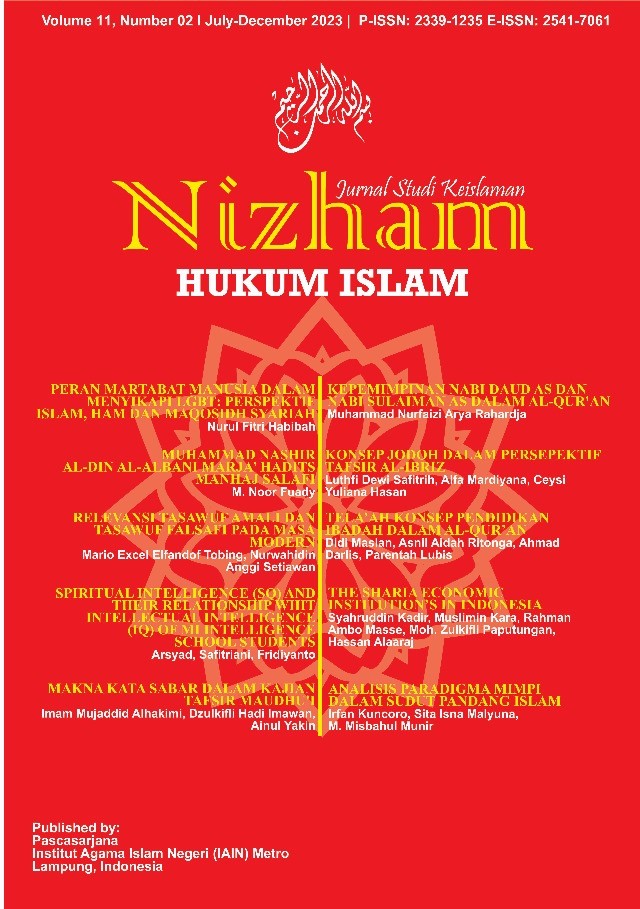The Sharia Economic Institution's History In Indonesia
DOI:
https://doi.org/10.32332/nizham.v11i02.7619Keywords:
Islamic Economics, History, Philosophy, Institutions.Abstract
The goal of this research is to learn more about the institutionalization of the Islamic economy in Indonesia, which is a fair economic system that works to preserve social and political life within bounds that don't jeopardize the general welfare. This study employs a method known as a literature review or literature study. The findings of this study show that external factors, such as the establishment of Islamic banks in other nations, trade missions, and preaching that facilitate the implementation of the Islamic economic system, have played a significant role in the history of Islamic economic thought and institutionalization in Indonesia. The internal aspect is public awareness, namely Muslim intellectuals' efforts to adopt an Islamic-based economic system among Indonesia's mostly Muslim population. With several laws controlling Islamic contracts and goods, institutionalization, and systems run by Islamic banks in Indonesia, the Islamic economy has up until now continued to grow. The growth of Islamic economic institutions, however, still falls short of Islamic financial literacy, where knowledge of Islamic economics is still quite poor.
Downloads
References
Aji, Cahyono Bayu, Muhammad Yafiz, and Sukiati. “Pemikiran Ekonomi Islam Indonesia (Studi Pemikiran Cendekiawan Muslim Indonesia Era Pra-Kemerdekaan-Orde Baru).” Al Muamalat Jurnal Hukum Ekonomi Syariah 2, no. 2 (2017): 35–51.
Badruzaman, Dudi. “Ekonomi Islam Dan Politik Hukum Di Indonesia.” Akualita 2, no. 2 (2019): 569–83.
Darmawan, Bayu Mukti. “PASCASARJANA UNIVERSITAS ISLAM NEGERI ( UIN ) ANTASARI HUKUM EKONOMI SYARIAH BANJARMASIN,” 2020.
Habibullah, Eka Sakti. “Hukum Ekonomi Syariah Dalam Tatanan Hukum Nasional.” Al-Mashlahah: Jurnal Hukum Islam Dan Pranata Sosial 5, no. 9 (2017): 691–710.
Idwal. “Sejarah Perkembangan Lembaga Keuangan Syariah.” Jurnal Iqtishaduna 9, no. 3 (2019): 12–42. http://downloads.esri.com/archydro/archydro/Doc/Overview of Arc Hydro terrain preprocessing workflows.pdf%0Ahttps://doi.org/10.1016/j.jhydrol.2017.11.003%0Ahttp://sites.tufts.edu/gis/files/2013/11/Watershed-and-Drainage-Delineation-by-Pour-Point.pdf%0Awww.
Loir, Henri Chamber. “The History of A History: The Variant Versions of The Sulalat Al-Salatin.” In Defence of History 33, no. 1 (2000): 1091–1112.
Othman, Shahrul Hilmi, Mohd Syukri Yeoh, RosMahwati Ahmad Zakaria, and Muammar Ghaddafi Hanafiah. “Aspek Muamalat Dalam Kitab Mir’At Al-Tullab Karya Shaykh Abdul Rauf Ali Al-Singkili.” Jurnal Ulwan 4, no. November 2018 (2019): 1–13.
Qoyum, Abdul, Asep Nurhalim, | Fithriady, Martini Dwi, Pusparini | Nurizal, Ismail Mohammad, Haikal | Khalifah, et al. Sejarah Pemikiran Ekonomi Islam, 2021.
Saeed, Abdullah. Islamic Banking and Interest : A Study of the Prohibition of Riba And Its Contemporary Interpretation. Journal of King Abdulaziz University-Islamic Economics. Jeddah: Leiden, 1996. https://doi.org/10.4197/islec.17-2.8.
Santi, Mei. “Perkembangan Ekonomi Syariah Di Indonesia.” Jurnal Eksyar (Jurnal Ekonomi Syariah) 07, no. 01 (2019): 47–56. http://ejournal.staim-tulungagung.ac.id/index.php/Eksyar.
Shandy Utama, Andrew. “Sejarah Dan Perkembangan Regulasi Mengenai Perbankan Syariah Dalam Sistem Hukum Nasional Di Indonesia.” Jurnal Wawasan Yuridika 2, no. 2 (2018): 187. https://doi.org/10.25072/jwy.v2i2.180.
Sofyan, Syaakir. “PERKEMBANGAN PERBANKAN SYARIAH DI INDONESIA.” Bilancia 10, no. 2 (2016): 91–112.
Suryani. “Sistem Perbankan Islam Di Indonesia: Sejarah Dan Prospek Pengembangan.” Muqtasid: Jurnal Ekonomi Dan Perbankan Syariah 3, no. 1 (2012): 111. https://doi.org/10.18326/muqtasid.v3i1.111-131.
Syarif, Fitrianur. “Perkembangan Hukum Ekonomi Syariah Di Indonesia.” Pleno Jure 8, no. 2 (2019): 1–16. https://doi.org/10.37541/plenojure.v8i2.38.









